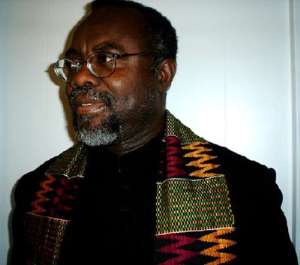
The Ghanaweb.com editorial writers could not even give the correct name of the extant junta leader whose government allegedly took the lion’s share of the legendary boxer DK Poison’s prize-fight money of $75,000 (USD). In 1976, the latter amount was nearly not as diddly as it presently appears. I have already observed in a previous column that $45,000 (USD), the money that was allegedly extorted from Ghana’s first World Featherweight Boxing Champion, is worth $205,000 (USD), or thereabouts, in today’s money. In 1976, a decent 3-bedroom house in urban Ghana cost about $50,000 (USD). Actually, it cost about GHȻ 50,000, which would have been remarkably less than $50,000 (USD).
Mr. Abdul-Malik Kweku Baako, the editor-publisher of the New Crusading newspaper, may have so soon forgotten that 1976 was also the period known in Ghanaian political circles as the “Yenntua Revolutionary Era,” when the Acheampong junta was under austere economic sanctions globally (See “Who Contracted DK Poison’s $45,000 Loan? – Kweku Baako Asks” Ghanaweb.com 10/8/20). Yes, the Ghanaweb.com editorialists called the junta leader of the then Supreme Military Council (SMC-I) Col. Isaac Kutu Acheampong. This is just how witheringly illiterate Ghanaian journalism has gotten in the globally enlightened Age of the Internet. How rancidly FKDUP Ghanaian journalism has sunk! I, however, do not agree with Mr. Baako that the alleged extortion of DK Poison’s prize-fight money was struck in Tokyo, Japan, on the basis of “a gentleman’s agreement.” We must also remember that for most of his 6-year junta domination of the Ghanaian political terrain, Col. Ignatius (Kwasi) Kutu Acheampong, later Gen. Acheampong, also served or doubled as the substantive Commissioner or Minister of Sports and Culture, as this ministerial portfolio was then designated, or perhaps Youth and Sports.
What the preceding means is that whoever struck what Mr. Baako described as an undignified extortion deal with Mr. David Kotei Poison, very likely did so with the full knowledge and express approval of the extant Commander-in-Chief of the Ghana Armed Forces. It also goes without saying that if a cash-strapped Chairman Jeremiah John Rawlings could have so flagrantly and impudently extorted or even cadged the diddly payola sum of $ 5 Million (USD) of the Nigerian taxpayer’s money from the late Gen. Sani Abacha in the late 1990’s, then it perfectly stands to reason that an even more cash-strapped Gen. Kutu Acheampong could equally have stooped as abysmally low as Chairman Rawlings later did, as to irresponsibly scam or extort Mr. Kotei Poison of approximately 60-percent of his prize-fight money.
Now, if, indeed, the “gentleman’s agreement” had been legitimately transacted through one of the global branches of Barclay’s Bank in Tokyo, Japan, or even the High Street Branch of the same bank in Accra, Ghana, then, of course, it goes without gainsaying that there must be in archival existence somewhere a forensically accessible record of some sort. This is where the national conversation on this subject ought to have been focused, even as I write, and not on the kind of hocus-pocus speculative acrobatics being chaotically exhibited all over the Internet. Unlike Mr. Baako, however, I am not that amply naïve to suppose that the Ghanaian species of humanity is any significantly different from its counterpart anywhere else in the world. Yes, some entity called the “Supreme Military Council” actually extorted the hard-earned prize-fight money of a 25-year-old man called David Kotei Poison.
The good news here is that it would take the “compassionate genius” of an Akyem-Mafia Capo to gloriously and responsibly repay the same some 44 years later, in order to restore the dignity and pride of our country once more. You see, Dear Reader, I am not only thinking about the real value of Mr. Kotei Poison’s $45,000 (USD) in today’s money. Take this from me: The Geisha Mackerel was actually bought from Tokyo, Japan with Mr. Kotei Poison’s cash. I am quite certain of this fact, because the memory cells of my taste buds inform me as such. In those days, at PERSCO, mackerel was all that was served for both lunch and supper. Sometimes, it was mackerel sandwiches that were served for breakfast at PERSCO as well.
*Visit my blog at: KwameOkoampaAhoofeJr
By Kwame Okoampa-Ahoofe, Jr., PhD
English Department, SUNY-Nassau
Garden City, New York
October 9, 2020
E-mail: [email protected]




 We’ll protect state wealth from opaque deals – Prof Jane Naana
We’ll protect state wealth from opaque deals – Prof Jane Naana
 Mauritania president says running for second term in June polls
Mauritania president says running for second term in June polls
 I won't ever say I was a mere driver’s mate' — Prof. Opoku-Agyemang
I won't ever say I was a mere driver’s mate' — Prof. Opoku-Agyemang
 2024 polls: 'EC struggling to defend credibility'— Prof. Opoku-Agyemang
2024 polls: 'EC struggling to defend credibility'— Prof. Opoku-Agyemang
 Akufo-Addo gov't's 'greed, unbridled arrogance, unrestrained impunity, sheer dis...
Akufo-Addo gov't's 'greed, unbridled arrogance, unrestrained impunity, sheer dis...
 Election 2024: Ghana needs an urgent reset, a leadership that is inspiring – Ma...
Election 2024: Ghana needs an urgent reset, a leadership that is inspiring – Ma...
 Partner NDC to rollout a future of limitless prospects – Prof Jane Naana Opoku-A...
Partner NDC to rollout a future of limitless prospects – Prof Jane Naana Opoku-A...
 NPP will remain in gov’t till Jesus comes — Diana Asamoah
NPP will remain in gov’t till Jesus comes — Diana Asamoah
 Sunyani Technical University demands apology from former SRC president over sex-...
Sunyani Technical University demands apology from former SRC president over sex-...
 'Dumsor' was resolved by Mahama but ‘incompetent' Akufo-Addo has destroyed the g...
'Dumsor' was resolved by Mahama but ‘incompetent' Akufo-Addo has destroyed the g...
